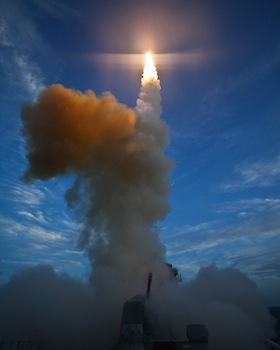Time to Rethink US-Russia Positions on Missile Defense
June 8, 2011
Featured Image
Today's top nuclear policy stories, with excerpts in bullet form.
Stories we're following today: Wednesday, June 8, 2011.
Russia Claims Ability to Penetrate NATO Missile Shield - Global Security Newswire [link]
- "Any attempts by those in NATO who dream of neutralizing our strategic potential will be futile," Russian Ambassador to NATO Dmitry Rogozin told Rossiya-24 television. "We have enough capacity to create both defensive and offensive means to counter any missile threat and to penetrate any missile defense," RIA Novosti reported.
- Rogozin's assertion, though, appears to contradict the findings of a Russian army analysis issued last month that concluded the United States' "phased adaptive approach" for European missile defense "would directly threaten the Russian nuclear potential" once it is finished around 2020.
Why Russia's Anti-Missile Defense - Yousef Butt in Politico [link]
- To examine whether there is any technical merit to Russian protestations, Ted Postol of the Massachusetts Institute of Technology and I carried out a detailed study of the planned system. Our analysis found that the system could, in fact, easily be re-configured to have a capability against Russian ICBMs — especially post-2018, when the more potent interceptors are brought on-line.
- A NATO decision to proceed with fielding Block II interceptors will result in an apparent paradox: Defenses with little or no combat effectiveness, but with technical and quantitative uncertainties that will cause cautious Russian military planners to treat them as if they were completely effective.
- Russia, and China, could react by increasing their stockpiles or perhaps block future nuclear arms reductions negotiations with the United States. This, in turn, could have far-ranging implications for global security — and for Obama’s goal of moving toward a world free of nuclear weapons.
Former Diplomat, Admiral See U.S. Strike Against Iran as Unlikely - Elaine Grossman in Global Security Newsire [link]
- The possibility that Washington would launch an attack against Tehran "seems to be as close to zero as one can get it, for which I'm deeply happy," said Thomas Pickering, a career ambassador who also served as undersecretary of State for political affairs.
- William Fallon, a former admiral who headed U.S. Central Command in the Middle East and South Asia...said there is probably "little chance" of a U.S. or Israeli strike against Iran, adding that "we ought to be working pretty hard to focus on other things that would have us in a different place."
- "Improvement in relations, in my opinion, will likely occur with the realization that the interests of both people are better addressed with engagement and cooperation rather than antagonism and hostility," Fallon told the audience.
Lucy and the (Nuclear) Football - Mark Thompson in Battleland [link]
- As the Pentagon's nuclear arsenal continues to shrink, so does the rationale for maintaining the Cold War's nuclear triad that still has nuclear weapons spread among subs, bombers and land-based missiles.
- If bombers are doomed, the latest proposal from inside the Air Force suggests, let's simply shift our bombers' share of nuclear weapons to our yet-to-be-bought F-35 fighters. Neat trick: not only does that preserve one of our legs of the triad, the Air Force thinking goes, but it throws a life preserver to the troubled F-35 program.
- Like all good Cold War hangovers, the continued existence of the nuclear triad is testament to the barnacled thinking of the nation's national-security establishment.
Iran Nuclear Chief: Tehran to Install Advanced Centrifuges at New Uranium Enrichment Site Soon - Associated Press [link]
- Vice President Fereidoun Abbasi, who also heads Iran’s nuclear agency, said on Wednesday that Tehran would set up the more efficient centrifuges, suitable for higher-grade uranium enrichment, at the Fordo site near the holy city of Qom in central Iran.
- “Soon, we will install 164-machine centrifuge cascades of the new generation (at Fordo),” Abbasi was quoted by the official IRNA news agency as saying after a Cabinet meeting.
- Abbasi’s announcement came a day after President Mahmoud Ahmadinejad criticized the IAEA chief Yukiya Amano, claiming the director has discredited the world body by alleging that Iran may be working on a nuclear weapons program.
News from the Department of Missile Defense Marketeering
Giving Away the Farm - James Woosley and Rebeccah Heinrichs in Foreign Policy [link]
- The Obama administration continues to demonstrate its penchant for bargaining away missile defense, and the United States is not currently developing and deploying missile defense technology at the rate and quantity the threat demands.
- The House defense bill added funds for short-range defenses, the GMD system, and Aegis; and perhaps most strikingly, it mandated the administration to conduct a study on the technical and operational feasibility of space-based interceptors -- the ideal type of system to intercept missiles at the optimal point, during their boost phase.



